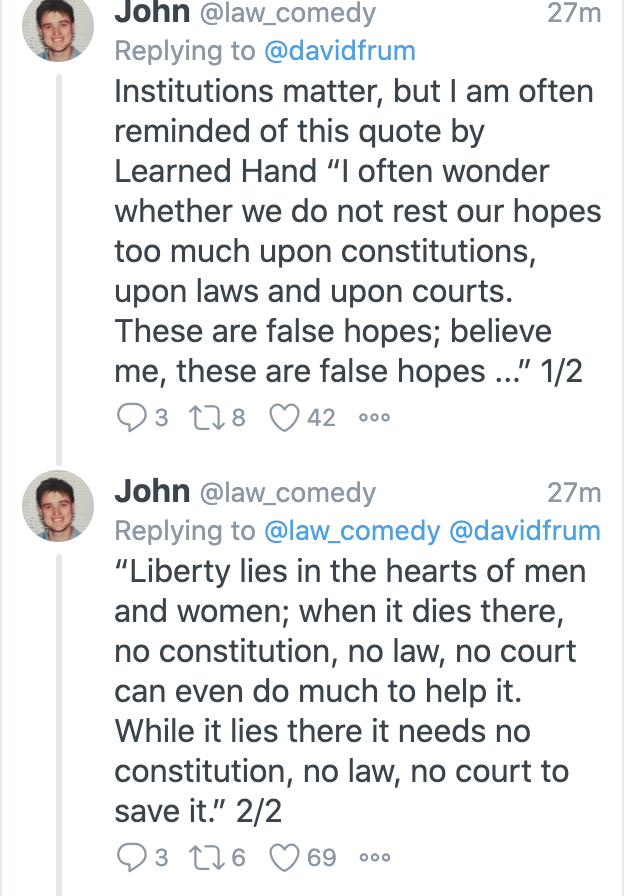No more happy talk about the "uniquely American transition of power." Trump presidency and this post-election period confirm that the US is *less* committed to democratic norms - and has *weaker* institutional safeguards for democracy - than peer wealthy democracies.
I asked a German diplomat friend to detail the safeguards against, say, a German chancellor trying to extend her tenure despite losing an election. He replied that such a thing was utterly impossible, he couldn't begin to enumerate the reasons why. And he was right of course.
Nobody wondered, "Will Gordon Brown or Theresa May leave office if defeated?" Ditto the Netherlands, New Zealand, and newer democracies like Portugal or South Korea. Democratic culture is deep, and election law is administered impartially. For all the boasting, not true in USA
Normally, inauguration day is a day of self-congratulation. This next one should be a day of self-reflection - and commitment to self-improvement. The US not only lags other democracies - it has regressed even by its own standards. Time for a new era of reform.
And reform begins with acceptance of some grim and unwanted realities.
The problems are not "on both sides."
The illiberal authoritarianism of some dean of students somewhere is not equivalent to illiberal authoritarianism by the Attorney General of the United States.
The problems are not "on both sides."
The illiberal authoritarianism of some dean of students somewhere is not equivalent to illiberal authoritarianism by the Attorney General of the United States.
Renewal of democratic institutions in the United States should be *non*-partisan - outside the everyday work of government - but cannot be *bi*-partisan when one party is so committed to (or frightened of) the individual leading the attack on democratic institutions.
And of course it's not just Trump.
As I detail in these 3 related articles
theatlantic.com/ideas/archive/…
theatlantic.com/ideas/archive/…
theatlantic.com/ideas/archive/…
even the non-Trump Republican party has committed itself to a program of minority rule
As I detail in these 3 related articles
theatlantic.com/ideas/archive/…
theatlantic.com/ideas/archive/…
theatlantic.com/ideas/archive/…
even the non-Trump Republican party has committed itself to a program of minority rule
It's hard thus to imagine that Congress can effectively conduct an investigation into Trump-era abuses by itself - since so many Republicans in Congress accepted, protected, and even connived in those abuses - and since so many Republicans in the states are now adding to the list
An independent commission with subpoena power is what is needed instead - tasked to recommend reform measures - and supported by a citizen movement outside the party system to pressure for state and federal reforms for voting rights, fair elections, and an honest Executive branch
Now counter-question
How does "liberty" - or more exactly the democratic idea of regulating state power by impartial law - get into the hearts of men and women in the first place?
It's not innate! By nature, we prefer that our tribe dominate. The democratic idea is learned.
How does "liberty" - or more exactly the democratic idea of regulating state power by impartial law - get into the hearts of men and women in the first place?
It's not innate! By nature, we prefer that our tribe dominate. The democratic idea is learned.
Learned how?
Learned by practice, and practice based upon laws and institutions.
(Remember Tocqueville's astute remarks on the importance of jury duty to self-government?)
So we have to build our institutions fair and strong to foster individual commitment to democracy
Learned by practice, and practice based upon laws and institutions.
(Remember Tocqueville's astute remarks on the importance of jury duty to self-government?)
So we have to build our institutions fair and strong to foster individual commitment to democracy
The Republican thralldom to Trump followed 20 years of undoing voting rights and civil rights. Republicans became acculturated gradually first to minority rule, then to authoritarian rule. Trump's false allegations of fraud rest on carefully nurtured prejudices.
I'm going on too long. But if anybody is still bearing with me, one last point ...
If I've had any one message in everything I've written about Trump and Trumpism since 2015 ... it's that the direct involvement of the people in elections is democracy's LAST line of defense, not its first.
Joe Biden summoned 80 million Americans to defend democracy. Great, but
Joe Biden summoned 80 million Americans to defend democracy. Great, but
that massive collective undertaking only followed the internal failure of the checks and balances erected to protect democracy in the long intervals between elections. And as we saw in 2020, malign actors can corrode voting rights during those long intervals between elections
80 million people voted to eject Trump and replace him. One official at the General Services Administration has successfully defied that vote for some 2 weeks. In a more democratic culture, she'd say No. The story of the Trump years is how many like her have said Yes.
Ok the (belated) end. For now.
• • •
Missing some Tweet in this thread? You can try to
force a refresh






